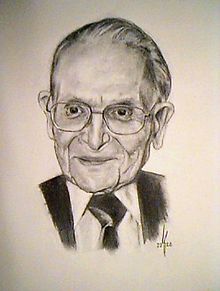Heinrich Vetter (entrepreneur)
Heinrich Vetter (born December 24, 1910 in Mannheim ; † February 3, 2003 in Ilvesheim ) was a German entrepreneur .

Life
Heinrich Vetter was born on December 24, 1910 as the son of a Mannheim merchant family. After graduating from high school and doing an internship in a textile company, he studied business administration at the Mannheim University of Applied Sciences . He was a member of the Catholic student associations KDStV Churpfalz Mannheim and KAV Suevia Berlin . After completing his studies, he joined the management of his parents' department store Vetter in Mannheim. The department store was founded in 1885 by Cousin's grandmother Barbara Müller and was one of the first department stores to enable its customers to purchase goods on credit. From 1933, the management of the credit bureau was the responsibility of junior boss Heinrich Vetter. Vetter joined the NSDAP on May 1, 1933 and, as a squad leader, was a member of the SA from 1933 to 1935 .
Between 1934 and 1938 the family bought several important building complexes, some of which were previously owned by Jews. In the course of the expropriation of Jewish merchants and the Aryanization , the Mannheimer Samt und Silk GmbH, one of the most important plastering wholesalers in Germany, with branches in Frankfurt and Cologne, became the property of the Vetter family. In November 1936, the Vetter department store moved into what was then the spectacular five-story tower by the Jewish architect Fritz Nathan . The building in N7 became the landmark of the Vetter department store.
When the war began in 1939, Vetter went to war as a volunteer. As an officer he took part in fighting in the Soviet Union and only barely survived a shot in the stomach in 1942. After returning from French captivity, he became manager of the Vetter department store in 1946. At the end of the sixties he handed over the department store to Horten AG and acted as their general representative. In 1985 Vetter retired into private life and devoted himself to building up an extensive collection of pictures and sculptures.
In 1997 Heinrich Vetter founded the "Heinrich Vetter Foundation", which aims to promote Mannheim and its citizens. The unmarried, childless businessman named the foundation as sole heir in his will. His patronage thus shaped the city of Mannheim even after his death. Numerous institutions are associated with his name, such as a path lined with large sculptures in Luisenpark , a shopping arcade in Mannheim city center, a forum in the Kunsthalle Mannheim , or a lecture hall in the University of Mannheim and the Baden-Württemberg Cooperative State University Mannheim . Prizes named after him, such as the Mannheim Heinrich Vetter Literature Prize, which was called the Mannheim Literature Prize until 2011, also remember him.
He has received numerous honors for his patronage. In 2001 the Faculty of Business Administration at the University of Mannheim awarded him an honorary doctorate . In 1993 he was awarded the Federal Cross of Merit on ribbon . Ilvesheim made him an honorary citizen in 1990 , as did the city of Mannheim in 1999. The Jewish community of Mannheim awarded Vetter the Medal of Honor in 1998. Since the Aryanizations of the Vetter family only became public after Heinrich Vetter's death, the Jewish community posthumously withdrew the medal of honor in 2013.
literature
- Rudolf Herzfeldt: Trade in Transition. 75 years Vetter Mannheim department store [1885–1960]. Publishing house for business journalism, Wiesbaden 1960.
- Ulrich Niess : Heinrich Vetter . In: The highest distinction in the city: portrait of 42 honorary citizens of Mannheim . Mannheim 2002, ISBN 3-926260-55-6 .
- Heinrich Vetter Foundation: In the footsteps of Heinrich Vetter . Ilvesheim 2008.
- Christiane Fritsche: Looted, repaid and compensated, Aryanization and reparation in Mannheim . Ubstadt-Weiher 2013, ISBN 978-3-89735-772-3 .
Individual evidence
- ^ Rudolf Herzfeldt: Trade in Transition. 75 years of department store Vetter Mannheim [1885 - 1960]. Wiesbaden 1960 .
- ^ Eva Martin-Schneider: A staged and illustrated exchange of words on May 9, 2012 in the FORUM youth culture center , at akjustiz Mannheim, accessed on October 21, 2012
- ↑ Justice working group in Mannheim: The role of the specialist trade in the exploitation of Jewish property in Mannheim and the post-war history of the VVV. (PDF; 146 kB) January 13, 2005, accessed on June 14, 2008 (presentations by the Justice Working Group on “ Action 3 ” in Mannheim).
- ↑ a b Heinrich Vetter Foundation: Heinrich Vetter. (No longer available online.) Archived from the original on December 12, 2007 ; Retrieved on June 15, 2008 (acknowledgment of Vetter by the Heinrich Vetter Foundation). Info: The archive link was inserted automatically and has not yet been checked. Please check the original and archive link according to the instructions and then remove this notice.
- ↑ Ulrich Niess: Heinrich Vetter: I want to remain a businessman . In: In the footsteps of Heinrich Vetter , ed. from the Heinrich Vetter Foundation, Ilvesheim, 2008, p. 37.
- ^ Jewish community recognizes Vetter Medal of Honor , Mannheimer Morgen March 5, 2013
Web links
| personal data | |
|---|---|
| SURNAME | Cousin, Heinrich |
| BRIEF DESCRIPTION | German entrepreneur |
| DATE OF BIRTH | December 24, 1910 |
| PLACE OF BIRTH | Mannheim |
| DATE OF DEATH | February 3, 2003 |
| Place of death | Ilvesheim |
